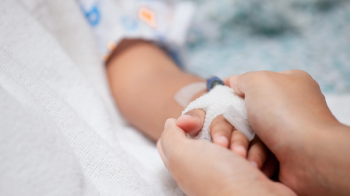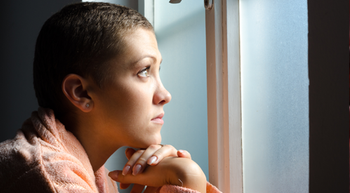
Providing oncologists with a baseline geriatric assessment summary with guidelines to manage toxicities may help reduce symptom burden in older patients with advanced cancer.

Providing oncologists with a baseline geriatric assessment summary with guidelines to manage toxicities may help reduce symptom burden in older patients with advanced cancer.

In this episode of "The Vitals," Ellen Miller, MSN, FNP-BC, talks about meeting a patient who realized she wanted to get pregnant after undergoing chemoradiation as a teenager.

Psychiatric distress and existential distress are associated with poor outcomes in patients with advanced cancers and treatment options such as psychotherapy have demonstrated limited effectiveness.

During the 40th Annual Chemotherapy Foundation Symposium, Sandra Kurtin, PhD, ANP-BC, FAPO, discussed improving health literacy in oncology care.

Jesus Cepero, PhD, RN, highlights the value of holistic care environments in pediatric oncology.

It is imperative that nurses and other health care professionals not only recognize the disparities in preventive screenings but become part of the solution. Early detection and cancer treatment must be accessible for those with disabilities, as it can help save lives.

In this episode The Vitals, Jeannette Meyer, MSN, RN, CCRN-K, CCNS, PCCN-K, ACHPN, discusses the importance of advance directives in critical care and her work with homeless populations.

Approximately 19.2% of American adults are caregivers for individuals 18 years or older. An estimated 6% care for a loved one with cancer.

When engaging with a family member of a patient who has died, nurses should consider using immediate interventions aimed at supporting the loved ones who are in shock and in pain following their loss.

At a follow-up of 60-months, investigators found that breast cancer survivors with higher C-reactive protein counts reported worse cognitive function over time.

Linda Laskowski-Jones, MS, APRN, ACNS-BC, CEN, NEA-BC, FAAN, discusses how oncology nurse leaders can help improve working environments for their staff.

A multidisciplinary intervention to address financial toxicity led to improved overall survival rates for patients with blood cancers.

Holistic options like acupuncture and music therapy may benefit those undergoing cancer treatment.

The more chronic conditions patients have, the more likely they are to be in debt.

Individuals with AML who underwent a bone marrow transplant are at an increased risk of developing subsequent neoplasms, and other chronic health conditions.

At the 2022 ASCO Quality Care Symposium, researchers discussed how Medicaid expansion was tied to earlier diagnoses, more accessible palliative care, and decreased mortality rates for patients with cancer.

Advanced practice providers are the future of survivorship care because of the tremendous value they offer to the practice and its patients.

Structured preceptorships promote competence, confidence, and job satisfaction in new oncology nurse practitioners.

Menstrual suppression can improve outcomes and quality of life in premenopausal women undergoing hematopoietic stem cell transplant.

Although oncology nurses are trained to show empathy and offer support, they lack the resources to adequately care for patients with acute mental health problems.

Karen Hande, PhD, DNP, ANP-BC, CNE, FAANP, ANEF, discusses increased patient interest in cannabinoids and how oncology nurses can steer pain management conversations to keep patients informed.

A significant portion of patients with lower-risk myelodysplastic syndromes achieved red-blood transfusion independence with luspatercept with no new safety signals.

The FDA has approved sodium thiosulfate to protect the hearing of pediatric patients who are at least 1 year old and are receiving cisplatin-based treatments.

Mary Anderson, BSN, RN, OCN; and Christina Bach, MBE, MSW, LCSW, OSW-C, FAOSW, discuss approaches to help patients navigate financial toxicity and insurance coverage in the age of oral anticancer drugs.

Intense-modulated therapy was associated with less patient-reported toxicities than conventional radiotherapy and demonstrated a comparable efficacy profile.

Julie Malo, CCRP, a research nurse with the University of Montreal, discusses a nurse-directed initiative examining how the gut microbiome affects immune checkpoint blockade responses in patients with non–small cell lung cancer.

Karen Hande, PhD(c), DNP, ANP-BC, CNE, FAANP, ANEF, explains the difference between some of the popular cannabinoid products that patients with cancer may be taking.

In this episode of “The Vitals,” Christine Miaskowski, PhD, RN, discusses research showcasing that adult patients receiving either a platinum-based chemotherapy, taxane alone, or a combined regimen of platinum- and taxane-based treatment may be at risk of hearing loss.

Innovative strategies are needed to ensure that adolescents and young adults with cancer who prefer to die at home are able to make that choice.

Donna Catamero, ANP-BC, OCN, CCRC, presented on her experience in expanding satellite clinical trial operations during the International Myeloma Society’s 6th Annual Nursing Symposium.